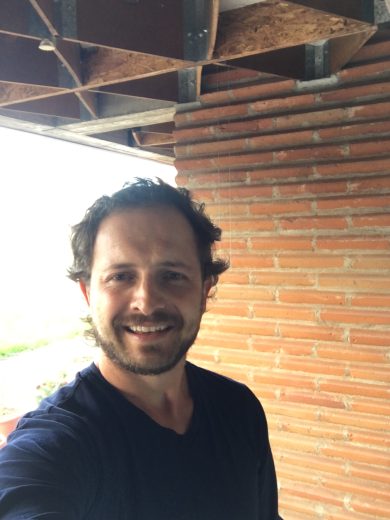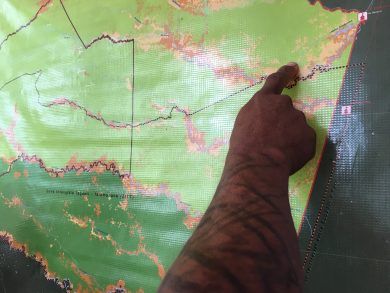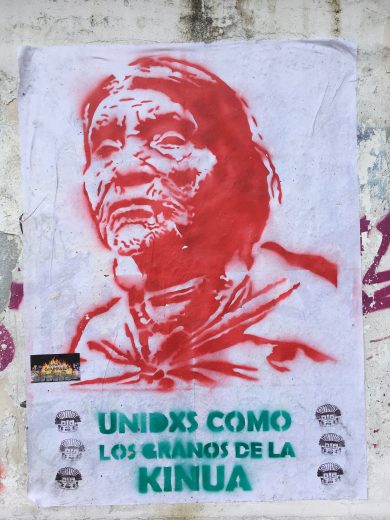Grad Profile: Pablo Escudero Vasconez
 Pablo Escudero Vasconez is a PhD student in History of Consciousness at UC Santa Cruz. His project explores the ways nation-building discourse in twentieth-century Andean and Amazonian regions worked to justify internal colonialism in the name of modernization. Escudero Vasconez served as a THI Summer Pathways Graduate Fellow (2023) and a Graduate Student Success Fellow (2021-2023). In February, we discussed his archival research in Ecuador, the need for a different “sense of history” to meaningfully parse the fight against extractivist practices in the Andes, and the role mentorship can play for first generation graduate students.
Pablo Escudero Vasconez is a PhD student in History of Consciousness at UC Santa Cruz. His project explores the ways nation-building discourse in twentieth-century Andean and Amazonian regions worked to justify internal colonialism in the name of modernization. Escudero Vasconez served as a THI Summer Pathways Graduate Fellow (2023) and a Graduate Student Success Fellow (2021-2023). In February, we discussed his archival research in Ecuador, the need for a different “sense of history” to meaningfully parse the fight against extractivist practices in the Andes, and the role mentorship can play for first generation graduate students.
Hi Pablo! Thanks for chatting with us about your ongoing research. To begin, could you give us a general synopsis of your research project?
In general terms, my work investigates the recursive logic of internal colonialism as a mirror of the basic grammar of the modern state and the dominant legal canon. The critique of internal colonialism in Latin America emerges most importantly out of social insurgencies, predominantly indigenous, belonging to a tradition critical of a political order that simultaneously considers itself neutral and the legitimate agent that translates differences into unity. I focus on the twentieth-century Andean and Amazonian regions at a transitional moment in which the ideas of underdevelopment and development were consolidating a sense of national belonging. This discourse became the force that gave direction to the arrow of history, while simultaneously justifying internal colonialism in the name of modernization.
In this narrative, the “nation-state” has been portrayed as the end of colonization, rather than its reproduction in a new form.
During this period, energy was channeled into the production of a politics of time, which relegated (in time) colonialism to the past by defining it in such a way as to make it opposed to the constitution of the nation-state, and in space, it displaced colonial threats as external to the national enclosure. In this narrative, the “nation-state” has been portrayed as the end of colonization, rather than its reproduction in a new form.
What comes next is well known: the legitimization of practices of extraction in service of the growing demands of global markets, the rise of historically unprecedented forms of indigenous territorial dispossession, urbanization, intensification of mining, oil extraction, deforestation, large-scale plantations, migration by dispossession, the intensification of universal linear history. Seen from the vantage point opened by the multiple insurgencies in the last century, the category of development was enabled by the construction of an opposing category, that of underdevelopment. As seen by Bolivian sociologist Silvia Rivera Cusicanqui, this logic that simultaneously produces and destroys the image of the past to then produce a new image, as it can be seen, for example, in contemporary ideas for “sustainable development,” is part and parcel of the logic of internal colonialism. *
Your work contextualizes and analyzes extractivist practices in the Ecuadorian Andes (Kichwan territories). I’m wondering if you can share more about what you perceive as the need for a different “sense of history” in order to meaningfully understand this conflict. Why is it so important to decenter the concept of progress from nation-state based narratives that justify extractivism in the name of development and how are current activists doing this work? What does “decentering the concept of progress” look like, on the ground?

Since the second half of the twentieth century, there have been at least forty massive insurgencies, which, in certain instances, have totally paralyzed Ecuador. To name five memorable ones: “La Gloriosa de Mayo” (1944), “Las Jornadas de Abril” (1978), “Levantamiento del Inti Raymi” (1990), “La Marcha del Agua (2012), “Estallido: Rebelión de Octubre” (2019). These uprisings have been frequently labeled by the government and mainstream media outlets as “terrorist attacks against progress, freedom, and property.” Seen from a different positionality, these uprisings correspond to the incursion and intensification of extractivist practices legitimized systematically by the Ecuadorian government, both in its neoliberal and more progressive forms.
A different “sense of history”— a phrase I heard first in a conversation with Prof. Massimiliano Tomba—speaks to the ways in which the notion of progress works in a polemical way: it gives direction to the arrow of time—meaning that progress is something that needs to be achieved in the future—while simultaneously categorizing other temporalities as anachronistic (therefore not yet modern). It is similar to what in postcolonial studies has been termed as the “denial of coevalness.”
When racist media outlets and official accounts represent these uprisings as “terrorist attacks against progress,” what they are doing is reminding indigenous peoples, allies, and “others” that they are secondary order citizens precisely because they are not yet fully modern. During the 2019 insurrection, the kichwan phrase ¡Warmikuna Kaypimi Kanchik! “Here we are the women” became a popular slogan throughout the protests that lasted fourteen days. This powerful slogan shouted out during the protest worked as a practical criticism that made it possible to experience a different sense of history. This slogan demonstrates not just the obvious contemporaneity of indigenous peoples, their political systems, along with the political role of indigenous women within a patriarchal society, but also it challenges the antagonistic and racialized construction of universal linear history.
I am particularly interested in your approach to this conflict from a constitutional/legality framework. You have mentioned that activists in the region are appealing against extractivism under the allegation that mining in these fragile ecosystems violates the rights of nature protected by the constitution of Ecuador since 2008. I’m curious about the ways indigenous activist groups have elected to fight this battle by using the “Western” rhetoric/precedent of “constitutionality” against its colonial wielders. Can you say more about this sort of reappropriation of the “masters’ tools” in this context?

This aspect is especially controversial. The rights of nature in the Ecuadorian constitution have been included as a tool to fight against extractivism, most importantly oil-related extractivism. Even though it has been used by activists and indigenous leaders and nations as a tool to defend their territories against the immense pressure and violence imposed by global demands for natural resources, what continues happening, and here lies the contradiction, is that the very structure of the modern state enables the negation of previously ascribed rights under so-called exceptional circumstances. Something that in other spaces has been called the “sovereign paradox.”
One event is worth recalling. In August of 2023, a popular referendum—voted on at the national level—was approved to stop oil extraction from the Yasuni ITT. The Yasuni is a national ecological reserve and one of the most biodiverse territories on the planet; it is located in what is nowadays the Ecuadorian Amazon and ancestral territories of the Waorani, Taromenane, Tagaeri, and Dugakaeri peoples (these last three are considered in voluntary isolation).
This referendum has been in the workings for about ten years, most notably by the environmentalist collective Yasunidos, along with the support of several organizations, including one of the most relevant in Ecuador, the CONAIE (Confederacion de Nacionalidades Indigenas del Ecuador). After the referendum was approved with 60% of the popular vote, the constitutional court designated that the Ecuadorian government has one year to dismantle all the oil-related infrastructure in these territories and undertake the necessary environmental reparations.
The strong and continuing efforts by diverse collectives, including the will of a majority of the Ecuadorian society to stop oil extraction on these territories, show the need for new imaginaries away from extractivist practices.
Shortly after, former neo-liberal president Guillermo Lasso (2021-2023) and the Ministry of Mines and Energy announced that the closure of these oil wells would be dilated as it was “not financially convenient for the country.” In January 2024, the newly elected president, Daniel Noboa, decreed a state of exception in the country to fight against narcotraffic. The president has argued that to win the war against narcotraffic, financial resources are required. Therefore, one more time, the closure of the oil wells has been postponed for another year.
A few conclusions from the above-mentioned events. The strong and continuing efforts by diverse collectives, including the will of a majority of the Ecuadorian society to stop oil extraction on these territories, show the need for new imaginaries away from extractivist practices. Additionally, it is increasingly important to pay close attention to those aspects that, in the struggle, are revealed as structural limitations within the modern state and dominant legal canon.
As part of your research work as a THI Summer Pathways Fellow, you conducted archival research at a host of libraries including the Library of the Casa de la Cultura Ecuatoriana, and the Catholic University’s Library, in addition to video and printed media research in the archives of private and independent media outlets in Quito and in the archives of the Water Museum (Yaku Parque Museo). I imagine this was a fascinating process. I’m always curious about archival research, and I’m wondering if there was a specific text or specific moment from your research that stands out to you–a moment of surprise, shock, awe, or understanding you’d like to share with us?
During my research, I accidentally stumbled upon a documentary produced by Arturo Hortas and Heriberto Gualinga titled “The Sarayaku Case.” One-third into the documentary, an archival scene from 2003 was showcased. The scenes showed the moment in which a helicopter was landing over the shores of the Bobonaza River, territories of the Sarayaku peoples in the Ecuadorian Amazon. From the helicopter, around ten Ecuadorian army men disembarked, including private security guards and people from an international oil company. A violent conflict arose after the Sarayaku people negated the possibility of oil extraction and exploration on their territories.
This event has been crucial for many reasons, one of them because this conflict led in important ways to the above-mentioned insurrection “Levantamiento del Inty Raimy” (1990), the formation of the CONAIE, the inclusion of the rights of nature, and Sumak kawsay into the Ecuadorian constitution (2008), and the favorable sentence for the Sarayaku people by the Interamerican Court for Human Rights (CIDH) in the legal case “Pueblo Indigena Kichwa de Sarayaku vs. Ecuador” (2012). At another level, and more related to my investigation of internal colonialism, watching this scene in the documentary, it was also revived my memory of the moment I watched those events happening over the news in 2003. I remember a very different story being narrated over those images on the news. If I remember correctly, it was labeled more in the line of Ecuadorians for and against development. This begs the question of why these conflicts are represented in the ways in which they are. What purpose does it serve to represent this conflict as one of Ecuadorians for and against development?
Reading this conflict over twenty years later, and more importantly, after the environmental catastrophes broadly experienced in the present, this conflict reveals something other than a clash of Ecuadorians against Ecuadorians for development. It seems more closely related to a long durée conflict over two different, if not antagonistic, ways of relating with land and the earth.
Elisa Cisneros, a kichwa woman from Sarayaku, reported during the conflict in 2003 by a local newspaper that: “We need to sacrifice ourselves; we are at war in our very same Ecuador” (my translation). This “internal war,” as Elisa mentions, is at the core of the logic of internal colonialism, one that I am suggesting needs to be paid closer attention to and requires a more systematic conceptualization. As internal colonialism is a concept that can only be defined at the moment when it is challenged, this “internal war” is at the core of the very few moments in which our modern concepts and categories are truly challenged and the moment in which a change of direction or pachakutic, becomes a possibility.
It was tremendously relevant and helpful to hear about experiences in academia and other related issues from faculty and graduate students who have gone through processes and experiences similar to yours.
From 2021-2023, you were a Graduate Student Success Fellow. Why is it important to provide humanities graduate students with community and mentorship? What’s one aspect of the program that felt particularly useful/helpful to you?
This is such an important program! I am grateful to have been able to participate in this initiative. People like me arrive at the humanities and to a PhD program not just from a different country, discipline, culture, and language, but also some of us are first gens. This sometimes makes it quite challenging to navigate academic environments. The space created by the Graduate Student Success Fellow program provides at least three things to orient us in this milieu better: (1) a safe space to share and discuss our personal and professional experiences and desires; (2) mentorship; and (3) a multigenerational group of people for advice and conversation. It was tremendously relevant and helpful to hear about experiences in academia and other related issues from faculty and graduate students who have gone through processes and experiences similar to yours.
*This work has benefited directly from seminars taken, multiple conversations and advice by Prof. Massimiliano Tomba, and Prof. Robert Nichols. I want to acknowledge their influence on my work, and the kind time they have given for advice. I also want to thank my classmate Emre Keser for proofreading this text.
Banner Image: Pablo Escudero, Just the people save the people, 2022, photograph, Quito – Ecuador.
